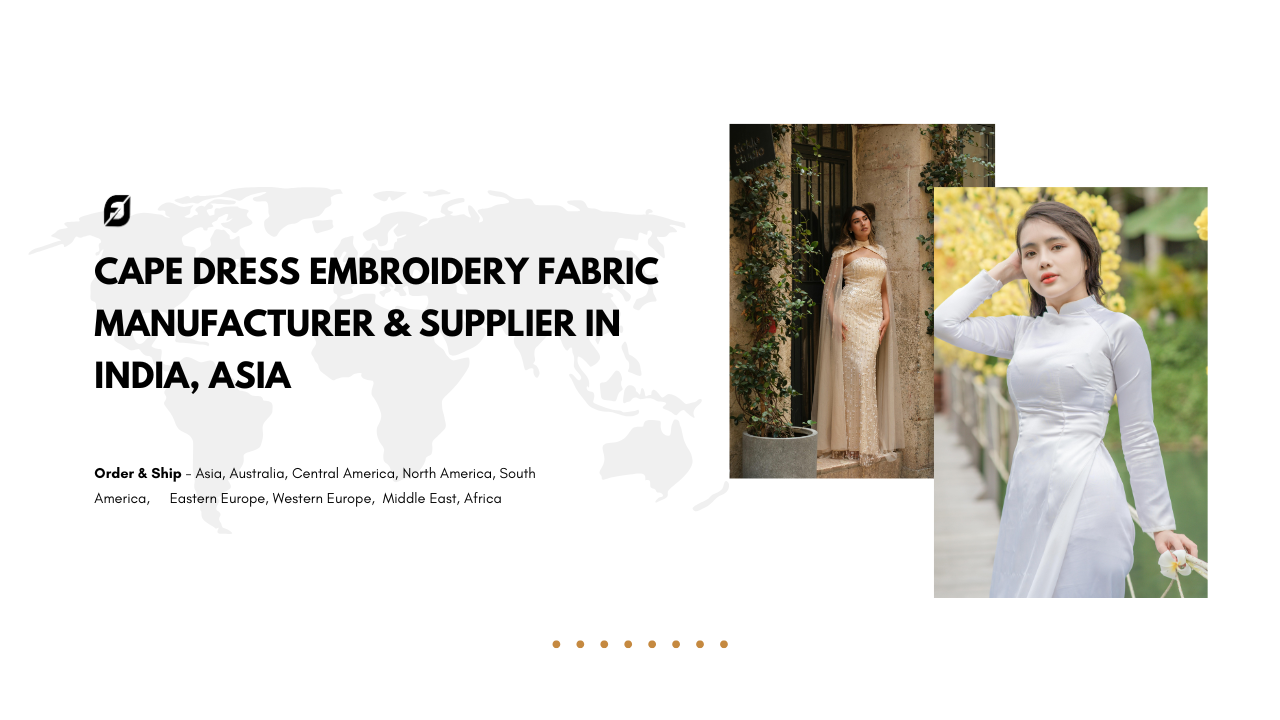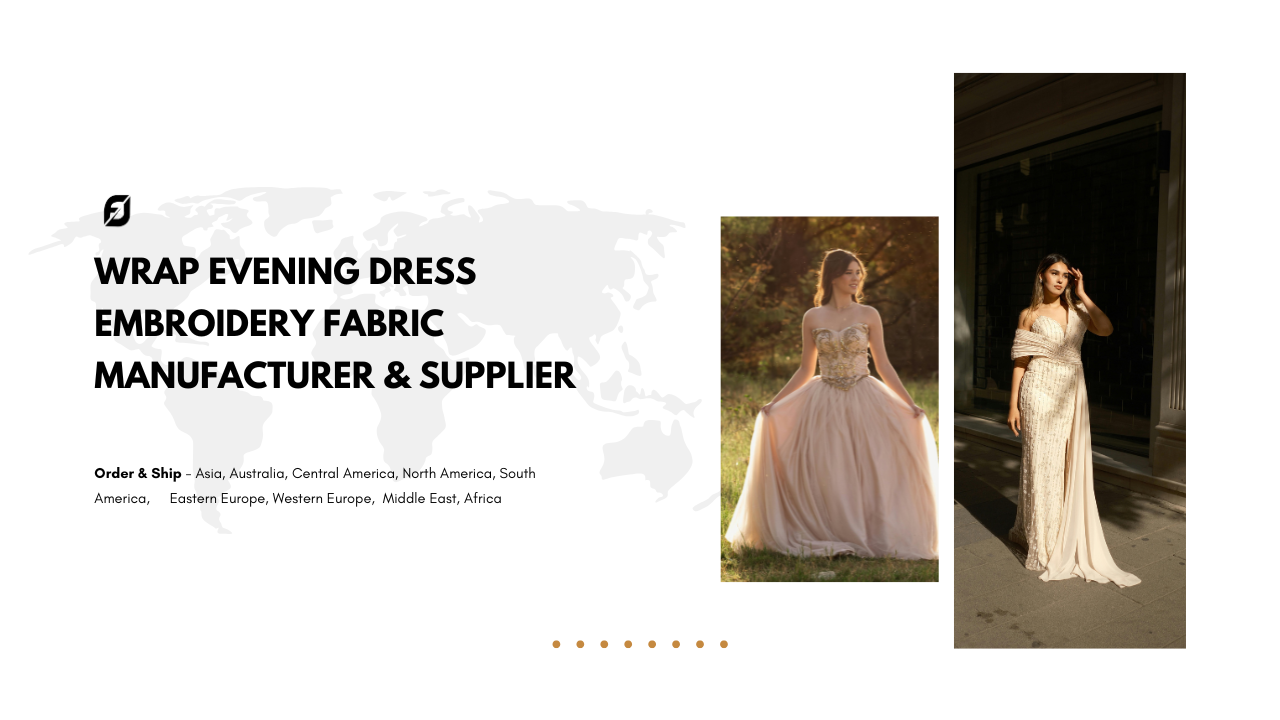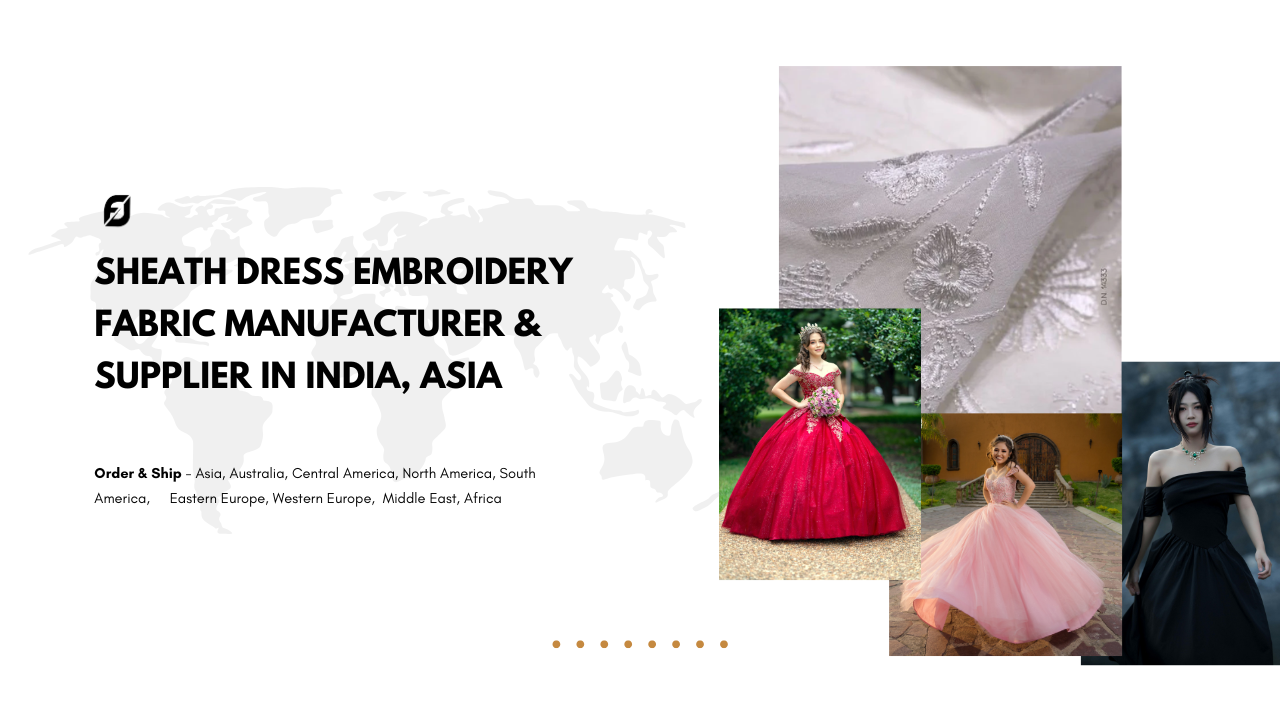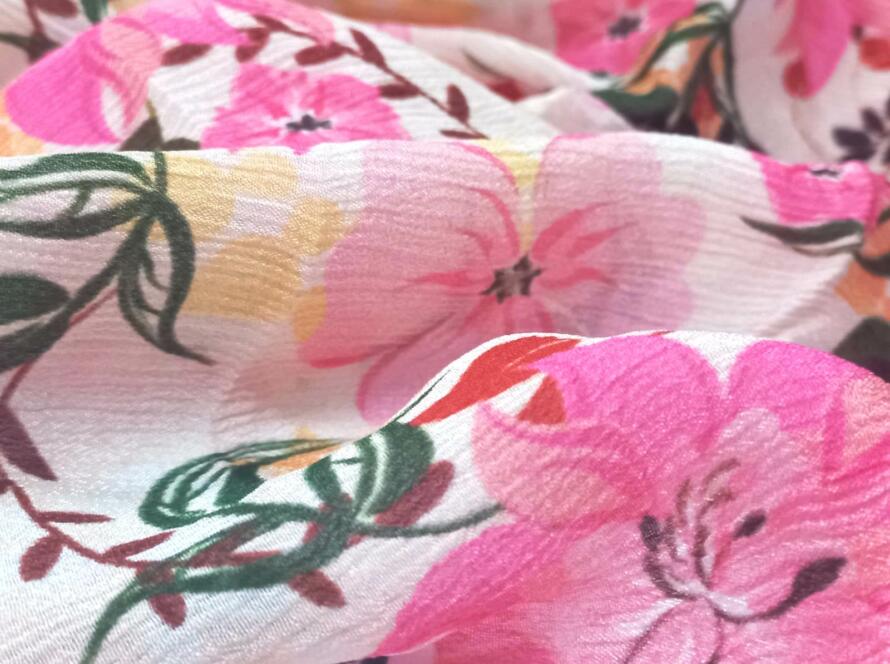Chikan embroidery is an exquisite art form that originated in Lucknow, India, and has since gained global recognition for its intricate craftsmanship and timeless beauty.
Chikan embroidery fabric, also known as “Chikankari,” is characterized by delicate handwork that adorns fabrics like cotton, georgette, and chanderi, giving them a regal, refined touch.
Chikan Embroidery Fabric: Best Uses, Designs, and Where to Buy
This fabric is widely cherished for its versatility, suitable for traditional wear such as sarees, anarkalis, lehengas, and salwar suits, and is also highly sought after for modern apparel like kurtis and tunics.
What is Chikan Embroidery Fabric?
Chikan embroidery involves the art of creating detailed patterns using a white thread on light, airy fabrics like cotton and muslin. Over time, this traditional craft has evolved to incorporate colored threads, beads, and sequins, offering a wide variety of designs suitable for different occasions. The embroidery includes various stitches like backstitch, chain stitch, and hemstitch, which create a delicate yet intricate design.
The Uses of Chikan Embroidery Fabric
The versatility of Chikan embroidery fabric makes it perfect for a range of clothing, from everyday wear to festive attire:
- Kurtis: One of the most popular uses of chikankari fabric is in kurtis. These are lightweight, breathable, and stylish, making them ideal for casual and office wear.
- Sarees & Lehengas: Chikankari enhances the elegance of sarees and lehengas, giving them a soft, feminine look that is perfect for weddings, festivals, and traditional events.
- Anarkalis & Suits: Anarkalis and suits with Chikan embroidery bring a rich cultural essence, combining tradition with contemporary style.
- Dupattas & Stoles: The subtle charm of Chikan work on dupattas and stoles adds grace to any ensemble.
Madhav Fashion: The Biggest Chikan Embroidery Fabric Manufacturer in Asia
Madhav Fashion, a renowned name in the textile industry, is the largest manufacturer and supplier of Chikan embroidery fabric in Asia. With a legacy of craftsmanship and quality, Madhav Fashion provides an extensive range of embroidered chikankari fabrics online, catering to customers across India and abroad. Whether you are a designer looking to create custom outfits or an individual looking for the perfect Chikankari kurti or saree, Madhav Fashion ensures top-tier quality and authenticity.
Buying Chikankari Fabrics Online
With the growing demand for Lucknowi Chikan fabrics, you can easily buy Chikan embroidery fabrics online. Madhav Fashion offers a wide selection of chikankari fabrics by the meter, allowing for customization of anarkalis, lehengas, sarees, and suits. The fabrics come in various materials like cotton, georgette, and chanderi, which are known for their lightweight nature and intricate embroidery.
Chikan Embroidery Across the Globe
While Chikan embroidery is deeply rooted in Indian heritage, its influence extends far beyond the country’s borders:
- Europe: In Europe, Chikan embroidery is often referred to as “whitework” or “shadow work,” and is used for delicate summer dresses and tunics. The demand for Indian handcraft has grown in European fashion circles, with Chikankari pieces often being featured in high-end fashion collections.
- Africa: In Africa, Chikan work is admired for its elegance and is often used in wedding garments and formal attire. The fabric’s lightweight and breathable qualities make it suitable for the warm climate.
- Middle East: In the Middle East, the fine detailing of Chikan embroidery fabric is often seen in abayas, kaftans, and other traditional wear. The timeless appeal of chikankari complements the luxurious, flowing garments popular in this region.
- Asia: Apart from India, Chikankari is popular in neighboring countries like Bangladesh and Pakistan, where it is used for both casual and formal wear. The intricate embroidery adds a touch of elegance to traditional salwar kameez and dupattas.
Different Types of Chikankari Fabrics
Madhav Fashion specializes in a wide variety of chikan embroidery fabrics, including:
- Lucknowi Chikan Thread Work on Cotton, Georgette, Chanderi Fabrics: Perfect for everyday wear, these fabrics provide comfort and style in equal measure.
- Customizable Fabrics: You can order chikankari fabric by the meter and customize your outfit, whether it’s an anarkali, lehenga, saree, or suit.
The Popularity of Chikankari Worldwide
Chikan embroidery is not just confined to India; its appeal has crossed continents. Fashion designers across the globe are incorporating this delicate handwork into their collections, blending traditional craftsmanship with modern silhouettes. Whether you’re looking for Chikan embroidery designs, want to buy Chikankari fabric online, or are searching for a reliable Chikan embroidery fabric manufacturer, Madhav Fashion stands out as the go-to choice.
To make shopping for Chikan embroidery easier, consider these popular queries:
- Chikan embroidery near me: Easily find stores and manufacturers selling Chikan fabric.
- Chikan embroidery online: Purchase high-quality Chikankari fabrics from trusted suppliers like Madhav Fashion.
- Chikankari Kurti: Ideal for both casual wear and special occasions, Chikan kurtis are always in vogue.
- Lucknowi Chikan fabrics: Known for their unique, traditional craftsmanship, these fabrics are timeless.
- Chikan embroidery price: Depending on the intricacy of the design and the fabric used, Chikan embroidery fabrics vary in price but are always worth the investment for their beauty and craftsmanship.
Whether you’re in Europe, Africa, the Middle East, or Asia, Chikan embroidery is a beloved art form that enhances any wardrobe with its elegance and sophistication. Madhav Fashion, with its vast expertise, is here to bring this iconic fabric to your doorstep.
___________________________________________
1. What is Chikan Embroidery Fabric?
Chikan embroidery fabric, also known as Chikankari, is a traditional hand embroidery technique that originated in Lucknow, India. It involves intricate and delicate needlework, usually done with white thread on soft fabrics like cotton, muslin, silk, or georgette. The embroidery consists of a variety of stitches, including shadow work, backstitch, and hemstitch, to create floral and geometric patterns.
Originally done with white thread, modern Chikankari also includes colored threads and embellishments like beads and sequins to add more vibrancy to the designs. The fabric is widely used in Indian ethnic wear such as sarees, anarkalis, kurtis, and dupattas, but its versatility extends to contemporary fashion as well.
Whether used in festive outfits or casual wear, Chikan embroidery adds a touch of elegance and sophistication to any garment. It has become popular worldwide for its light, airy feel and intricate detailing. Today, Madhav Fashion, one of the biggest manufacturers in Asia, offers a wide variety of Chikan embroidery fabrics for both wholesale and custom designs, catering to global fashion trends while preserving the art’s cultural heritage.
2. Where Can I Buy Chikan Embroidery Fabric Online?
You can buy Chikan embroidery fabric online from a variety of retailers, but one of the most trusted sources is Madhav Fashion, Asia’s biggest manufacturer of Chikan embroidery fabrics. Madhav Fashion offers a vast selection of fabrics, including Lucknowi Chikan thread work on cotton, georgette, and chanderi fabrics. Customers can purchase Chikankari fabric by the meter, allowing for easy customization of outfits such as anarkalis, lehengas, sarees, and suits.
Whether you’re looking for ready-made garments or raw fabric to create your own designs, Madhav Fashion offers premium quality and a wide range of options. Additionally, they provide options for bulk orders, making it convenient for designers and retailers. Beyond India, Chikan embroidery is in high demand across Europe, the Middle East, Africa, and other regions, and online shopping platforms make it easier than ever to access authentic Chikankari fabrics globally. Most reputable sellers offer detailed product descriptions and high-resolution images to help buyers choose the perfect fabric for their needs, along with secure payment methods and reliable shipping options to ensure a smooth purchasing experience.
3. What Makes Chikan Embroidery Fabric Unique?
Chikan embroidery fabric is unique due to its intricate craftsmanship, delicate design, and cultural heritage. Originating from the Mughal era in Lucknow, this art form uses fine needlework to create beautiful patterns, typically with white thread on lightweight fabrics like cotton and muslin. What sets Chikan embroidery apart is the variety of stitches employed, such as shadow work, backstitch, chain stitch, and hemstitch, which produce a raised, textured effect on the fabric. These stitches are meticulously applied by hand, making each piece a work of art.
The versatility of Chikan embroidery is another reason for its uniqueness. While traditionally used for ethnic garments like sarees, kurtis, and dupattas, the fabric has evolved to be used in contemporary fashion, home decor, and accessories. Its timeless appeal and adaptability to modern designs make it a favorite among designers globally. Additionally, Chikan embroidery fabric is celebrated for its lightweight, breathable qualities, which make it ideal for warm climates. Its understated elegance makes it suitable for both casual wear and formal occasions, adding to its widespread appeal across cultures and countries.
4. What Types of Garments Can Be Made from Chikan Embroidery Fabric?
Chikan embroidery fabric is extremely versatile and can be used to create a wide range of garments that are both traditional and modern. Some of the most popular items made from this fabric include:
- Kurtis: Chikankari kurtis are a staple in Indian fashion, known for their comfort and elegance. These can be worn casually or styled for office wear.
- Sarees: Chikan embroidery on sarees adds a delicate touch to traditional Indian attire. It’s perfect for festive occasions, weddings, and formal events.
- Lehengas: Chikan-embroidered lehengas are a popular choice for brides and for festive occasions, giving an understated yet luxurious look.
- Anarkalis & Suits: Anarkali suits with Chikan embroidery offer a beautiful blend of tradition and modernity, perfect for festive occasions.
- Dupattas: A Chikan-embroidered dupatta can elevate any simple outfit, adding grace and elegance.
In addition to traditional Indian wear, Chikan embroidery is now being incorporated into modern fashion such as tunics, dresses, and even home decor items like cushion covers and table runners. The fabric’s light, breathable nature also makes it a popular choice for summer and spring clothing.
5. What Are the Different Stitches Used in Chikan Embroidery?
Chikan embroidery is renowned for its intricate needlework, which involves a variety of stitches that create different textures and patterns on the fabric. The most common stitches used in Chikankari include:
- Tepchi (Running Stitch): This basic stitch is used to create outlines and borders, giving a clean and defined look to the embroidery.
- Bakhiya (Shadow Work): This stitch is worked on the back of the fabric, creating a shadow-like effect on the front. It is often used to fill large floral or geometric patterns.
- Phanda: A knot stitch that forms small, circular shapes, often used for creating buds or petals in floral designs.
- Jali Work: This openwork stitch creates a lace-like appearance on the fabric. The stitches are closely placed to form a net-like structure, which adds depth to the design.
- Murri: A variation of the Phanda stitch, this is used to form small, raised stitches, resembling grains of rice. It adds a three-dimensional effect to the fabric.
These stitches, combined with intricate patterns, make Chikan embroidery a fine art, requiring skilled craftsmanship.
6. How Do I Care for Chikan Embroidery Fabric?
Caring for Chikan embroidery fabric requires special attention to ensure its longevity, as the delicate stitches can be sensitive to rough handling and harsh chemicals. Here are some tips to maintain the beauty of your Chikankari garments:
- Handwash: It is recommended to hand wash Chikan-embroidered fabric with mild detergent. Avoid using hot water, as it may weaken the threads.
- Avoid Harsh Chemicals: Stay away from bleach or strong cleaning agents, as these can damage the delicate embroidery.
- Dry in Shade: Always air dry the fabric in shade to prevent the colors from fading and the fabric from becoming stiff. Direct sunlight can weaken the embroidery threads.
- Ironing: Use a low heat setting when ironing, and it’s best to iron on the reverse side of the fabric to protect the embroidery work.
- Storage: Store Chikankari fabrics in a cool, dry place. If possible, keep the garment in a cloth bag to avoid any damage from humidity or dust.
By following these care instructions, you can preserve the intricate beauty of your Chikan embroidery garments for years to come.
7. What is the History of Chikan Embroidery?
Chikan embroidery has a rich history that dates back to the Mughal era in India, specifically to the 3rd century BC. However, it gained prominence during the reign of the Mughal emperor Jahangir, whose wife Nur Jahan was an ardent patron of the art. The word “Chikan” is derived from the Persian word “Chikeen,” meaning embroidery. Initially, the art was practiced using white thread on muslin cloth, which was popular for its lightweight texture.
Over time, the craft evolved and spread beyond Lucknow, gaining recognition across India and internationally. Traditionally, Chikan embroidery was done using simple stitches to create floral patterns, reflecting Mughal aesthetics. However, in modern times, the craft has expanded to include a variety of colors, threads, and materials such as georgette, silk, and chanderi. Today, Chikan embroidery is a symbol of luxury and elegance, with its timeless appeal being embraced by designers globally. Despite the passage of centuries, the art form has retained its original charm while adapting to contemporary fashion needs.
8. Why is Madhav Fashion Known as the Biggest Manufacturer of Chikan Embroidery Fabric in Asia?
Madhav Fashion has earned its reputation as the biggest manufacturer of Chikan embroidery fabric in Asia through its commitment to quality, craftsmanship, and innovation. Based in India, Madhav Fashion specializes in producing a wide range of embroidered fabrics, including traditional Chikan embroidery. The company employs highly skilled artisans who carry forward the legacy of this ancient craft while integrating modern techniques and materials.
With a focus on both traditional and contemporary designs, Madhav Fashion caters to a global clientele, offering Chikan fabrics for ethnic wear, bridal outfits, and even high-end fashion collections. Their manufacturing processes follow strict quality control measures to ensure that every piece of fabric is of the highest standard. In addition to this, Madhav Fashion has an extensive online presence, making it easy for customers to purchase authentic Chikankari fabrics from anywhere in the world. The company also offers customization services, allowing designers and retailers to create unique pieces tailored to their specific needs. This blend of tradition, quality, and innovation has made Madhav Fashion a leader in the Chikan embroidery fabric industry.
9. What is the Difference Between Chikankari and Other Embroideries?
Chikankari stands out from other types of embroidery due to its unique technique and origin. While most embroidery styles use colored threads and are often bold, Chikankari is known for its subtle, intricate patterns, traditionally done with white thread on soft fabrics like cotton
and muslin. This gives Chikankari a delicate, airy feel that is hard to replicate with other forms of embroidery. Additionally, Chikan embroidery employs a variety of stitches like shadow work, jali work, and bakhiya, which create a three-dimensional effect on the fabric. In contrast, other embroidery styles, such as Zardozi or Phulkari, use heavier threads, metallic elements, and bolder designs, often giving a more opulent look. Chikankari is also deeply rooted in the Mughal aesthetic, reflecting the influence of Persian art, while other Indian embroideries like Kantha, Kasuti, and Parsi Gara are influenced by different regional cultures and histories. Chikankari’s understated elegance and versatility make it a popular choice for both casual and formal wear.
10. How Can I Incorporate Chikan Embroidery into Modern Fashion?
Chikan embroidery is not just limited to traditional Indian wear but can be seamlessly incorporated into modern fashion for a chic, sophisticated look. Here are some ways to blend Chikan embroidery into contemporary styles:
- Dresses & Tunics: Opt for Chikan-embroidered tunics or dresses that pair well with jeans or leggings for a casual yet stylish outfit.
- Jackets: Chikan embroidery on denim or leather jackets offers a fresh twist, blending traditional craftsmanship with edgy fashion.
- Boho-Chic Look: Chikankari maxi dresses, skirts, or crop tops can be paired with ethnic jewelry for a boho-inspired ensemble.
- Western Formal Wear: Incorporate Chikan embroidery into blouses or shirts for office wear, combining elegance with a professional look.
- Accessories: Add Chikan-embroidered scarves, bags, or shoes to your wardrobe for a subtle hint of ethnic charm in your daily wear.
By blending traditional Chikan embroidery with modern silhouettes, you can create versatile, fashionable outfits that are suitable for a variety of occasions, from casual outings to formal events.






